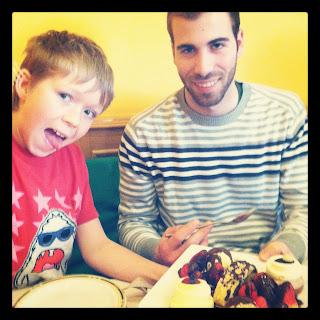 People generally use the word "alien" to speak of a human outside of his or her normal geographical location, or when referring to some strange, unknown creature from another planet. Who would have known that it was possible to exemplify both nuances of meaning at once! We are now one month in and FINALLY my children and I have evicted the awful, unpleasant and rude extra-terrestrials that took over our normally communicative, sweet and fun selves. One month. 30 days to accept our new life, stop pushing against it, settle in.
People generally use the word "alien" to speak of a human outside of his or her normal geographical location, or when referring to some strange, unknown creature from another planet. Who would have known that it was possible to exemplify both nuances of meaning at once! We are now one month in and FINALLY my children and I have evicted the awful, unpleasant and rude extra-terrestrials that took over our normally communicative, sweet and fun selves. One month. 30 days to accept our new life, stop pushing against it, settle in.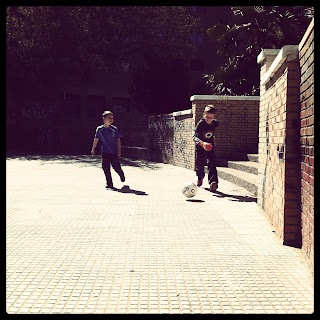
These alien attacks came in droves or waves, at first constant, later intermittent, but always frequent. It wasn't until recently that I noticed that I always lagged behind the boys in my recovery from these attacks. Although I have lived in Spain before and wasn't experiencing true culture shock, I was dealing with a "new" family - they looked and sounded like my children, but sure didn't act like them. I tried and tried and tried so so hard to be impervious to their whining and bickering, to remain relaxed and pleasant, to allow my mood to beckon them rather than theirs to decide mine. But I acknowledge that my alien remained until I was absolutely confident that theirs were gone. This single-parent-thing is toughest in these moments; I never felt like I could let my guard down. I have learned that I am not yet at a place where I can remain in complete control of my behavior without allowing theirs to influence me. There were times when I spent entire meals and even days with friends without finishing a single adult conversation, because I spent the whole time correcting my children for outlandish (acknowledgement of subjectivity) behavior I did not know they were capable of. Hours of such behavior. With no respite. Unless they were stuck in front of a screen, I did not enjoy a moment of peace. I apologized to my friends repeatedly, explained that we aren't normally this unpleasant; I felt icky and contaminated and cancerous. In response, I groped. We had family meetings, made up star charts, discussed allowance charts with lists to track fines from offenses, made for quiet time and fun outings, discussed how normal it was to act out when we feel out of our element or out of control. But still they railed, taking their frustrations out on each other, on themselves, on me. I occasionally threw out for subpar the training and multiple parenting classes I have under my belt and, with pleasure, crossed lines. Although I never arrived at reacting physically to my children, they saw a lurking, unpleasant side. On a few occasions I was snarky and sarcastic, yelled at them, compared them to other children their age. I once told one child he was acting like a jerk and the other that I wanted to slap him. I saw them throw fits and felt no mercy. Simply, I had none of my regular tools and was at a loss; after all, what do you take away when a child has already lost all of his privileges and you have neighbors' comfort to consider? Of course, later in quiet moments, I felt for them. I knew how difficult this had to be, that this was a normal part of the process. I hugged them and kissed them and told them how proud I was of their efforts. I marveled at their achievements, reminded them. I hugged them again. I tried to explain that I understood, but had to do my job.
 So, we talked and talked and talked. We talked about the choices we have in our lives, what we want, how we can create our day, our role in relationships with those around us, our mood. We talked about how we react to stress and challenge, how I respond to stress and challenge, how this is all a choice. And I acknowledged that I still have a lot to learn. Just because as adults we can remove ourselves from the stimulation or environment that stresses us does not mean we have truly learned how to deal with it. Evasion works wonderfully when one is capable of doing so. But when it is all-encompassing all we have is ourselves, and in these moments we truly learn what we are capable of. From now on, I am going to flatten myself against a wall, close my eyes, breathe and remain until I can create a NEW, improved moment.
So, we talked and talked and talked. We talked about the choices we have in our lives, what we want, how we can create our day, our role in relationships with those around us, our mood. We talked about how we react to stress and challenge, how I respond to stress and challenge, how this is all a choice. And I acknowledged that I still have a lot to learn. Just because as adults we can remove ourselves from the stimulation or environment that stresses us does not mean we have truly learned how to deal with it. Evasion works wonderfully when one is capable of doing so. But when it is all-encompassing all we have is ourselves, and in these moments we truly learn what we are capable of. From now on, I am going to flatten myself against a wall, close my eyes, breathe and remain until I can create a NEW, improved moment.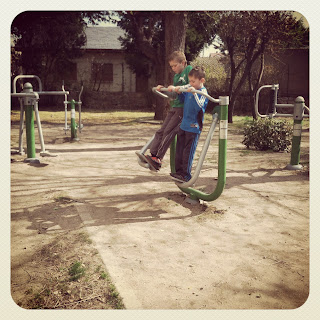 Thankfully, I can see we have passed a hurdle. The boys are making friends, are invited to birthday parties, can enjoy a meal with a bunch of adults, relax and have fun. They know what is expected of them at school. They know that they ought to keep both hands above the table and both feet under their chair at mealtimes. They know that when inside they can have fun making silly faces and dancing, but need to save screaming and jumping for the park. They can answer questions, and even ask some, instead of avoiding contact out of embarrassment. They have learned when they can move away from my side in public. And the anticipation of Daddy's upcoming visit is like this rainy day on the first day of Spring - the knowledge of what is to come breeds excitement and good cheer. I am so inspired and amazed and impressed by their progress. They have made the jump from small-town boys to big city kids and they know it. They can navigate the public transportation systems with ease, speak of planetariums and museums. They no longer complain about cigarette smoke, dog poop or traffic noise. They have invented new games, new opportunities for fun that were invisible one month ago. (Kicking a plastic cup on the street is now a wonderful way to spend the afternoon!) Yesterday my eldest requested "taking the metro to Gran Vía to watch people, chat and have a Fanta." Most exciting of all, they are speaking Spanish. They may make mistakes (Tu tengo mi coche. - You (I) have my car,) but people can understand them, and it is a whole new world out there. I can only imagine where they will be in three months' time.
Thankfully, I can see we have passed a hurdle. The boys are making friends, are invited to birthday parties, can enjoy a meal with a bunch of adults, relax and have fun. They know what is expected of them at school. They know that they ought to keep both hands above the table and both feet under their chair at mealtimes. They know that when inside they can have fun making silly faces and dancing, but need to save screaming and jumping for the park. They can answer questions, and even ask some, instead of avoiding contact out of embarrassment. They have learned when they can move away from my side in public. And the anticipation of Daddy's upcoming visit is like this rainy day on the first day of Spring - the knowledge of what is to come breeds excitement and good cheer. I am so inspired and amazed and impressed by their progress. They have made the jump from small-town boys to big city kids and they know it. They can navigate the public transportation systems with ease, speak of planetariums and museums. They no longer complain about cigarette smoke, dog poop or traffic noise. They have invented new games, new opportunities for fun that were invisible one month ago. (Kicking a plastic cup on the street is now a wonderful way to spend the afternoon!) Yesterday my eldest requested "taking the metro to Gran Vía to watch people, chat and have a Fanta." Most exciting of all, they are speaking Spanish. They may make mistakes (Tu tengo mi coche. - You (I) have my car,) but people can understand them, and it is a whole new world out there. I can only imagine where they will be in three months' time.
What we all have learned thus far is beyond words. I have no doubt that we are better people for our experiences here, that our lives have changed for the better. The boys have grown up so much in some ways, and regained a sweet youthfulness in others. Although the first month of our trip was extremely challenging, I can feel that there has been a shift. We have begun to simply live our lives, instead of struggling to adapt. I like to think that we climbed from its base an underwater volcano, and have now reached the beach of the tropical island. The crusade is over. It is all exploration from here on out.























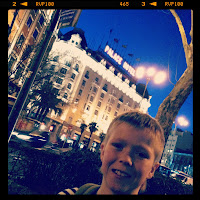

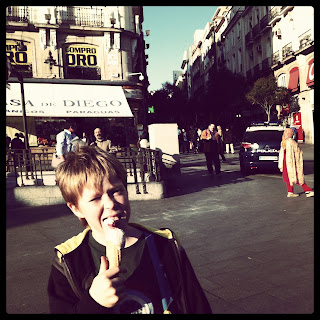



.jpg)


